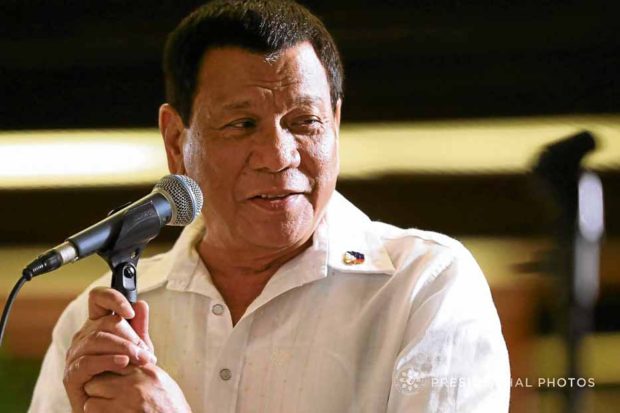Congress leaders float idea of Duterte term extension

President Rodrigo Duterte —MALACAÑANG PHOTO
Leaders of Congress are floating the idea of either extending the term of President Rodrigo Duterte or those of lawmakers.
Mr. Duterte’s term may be extended beyond 2022 if the country becomes a federal state, Senate President Aquilino Pimentel III said on Wednesday.
Pimentel made the statement after Speaker Pantaleon Alvarez said a “no-election (No-El)” scenario was possible.
Alvarez said dispensing with elections in May 2019 would extend the terms of lawmakers up for reelection.
This assumes Congress would succeed in amending the Constitution and switching to a federal form of government and the public would approve it in a plebiscite, the Speaker said.
As Congress prioritizes the shift to federalism through a constituent assembly (Con-ass) this year, the timetable of upcoming elections will be affected, particularly the 2019 elections, Alvarez said in an interview on ANC.
He said the two chambers of Congress could convene themselves into a Con-ass in January and complete the revision of the 1987 Constitution by the middle of this year.
The proposed Constitution will then be put to a plebiscite coinciding with the barangay and youth council elections in May, Alvarez said.
The transitory provisions approved in the plebiscite may render the elections for lawmakers unnecessary as the government shifts to the new system, the Speaker said.
Pimentel is against scrapping the elections if the government would shift to federalism.
“That is not an ‘either-or’ situation. We can shift to federalism and allow all scheduled elections under the existing Constitution to go on and be held,” the Senate President said in text messages to reporters.
Asked whether the shift to another form of government would allow Mr. Duterte to extend his term in a transition government, Pimentel said it “depends on the transitory provisions” and “depends, too, on when we approve the new Constitution.”
“We can extend the President’s term,” Pimentel said “if [the President] is amenable to it and since that extension will be part of the new Constitution, the new Constitution is approved by the people themselves.”
No intention to stay
Presidential spokesperson Harry Roque said Mr. Duterte had no intention to extend his stay in power.
“I can categorically state that [President Duterte] does not want that (a term extension). He wants to cut short his term rather than lengthen it,” Roque said in a statement.
Roque said Mr. Duterte would strictly follow the Constitution, including its schedule for elections.
“So, unless the Constitution is amended, which includes being ratified by the people prior to the date set in the Constitution, elections will have to push through,” he added.
An opposition congressman expressed suspicion about the real motive behind the No-El scenario.
Incumbent officials favored
“The cat is out of the bag. It reveals the true intentions of the Duterte administration to perpetuate themselves in power,” said Akbayan Rep. Tom Villarin.
In the ANC interview, Alvarez acknowledged the point that a No-El scenario would favor incumbent officials like himself, but he said this was a necessary step in changing the structure of the government.
“When you shift [to] a federal system of government, you change the structure of the government. You will create states … you will elect governors in each state. You don’t know yet the setup in provinces, towns and cities. We still do not know,” Alvarez said.
Asked about a term extension for Mr. Duterte, Senate Minority Leader Franklin Drilon said: “[T]he real purpose of federalism is out—term extension!”
“The Liberal Party (LP) will oppose such immoral proposition,” Drilon said.
Sen. Francis Pangilinan, the LP president, wondered whether Congress could be trusted with changing the Constitution.
“After witnessing the congressional hearings on extrajudicial killings, on Sen. Leila de Lima’s alleged connection with drug syndicates, on the P6.4-billion Bureau of Customs ‘shabu’ smuggling scandal allegedly involving the Davao Group, the impeachment [complaint against] Chief Justice Sereno, the approval of the one-year extension of martial law in Mindanao, the slashing of the Commission on Human Rights budget to P1,000, will you trust Congress with Charter change?” Pangilinan said in a statement.
Sen. Panfilo Lacson expressed doubt the Duterte administration would be able to push for Charter change.
Three modes
“Easier said than done, especially with the timeline that they’re looking at, which is the conduct of a plebiscite in May this year. Time is not on the side of those advocating for change of our Constitution,” Lacson said.
The Constitution identifies three ways by which it may be changed or revised: by Congress acting as Con-ass, by Con-con (constitutional convention whose delegates are elected), or by a people’s initiative through a petition by 12 percent of the electorate.
Under Con-ass, the Senate and House, acting as one body, will introduce and approve changes to the Constitution by an absolute three-fourths vote and subject to a national referendum.
The constitutional amendments committee is in the middle of deliberations on two proposed drafts of a new Constitution, one prepared by two House members and the other drafted by a study group of the PDP-Laban Federalism Institute.
Not ready
Mr. Duterte lamented last month that Filipinos were “not ready” for a federal form of government.
He said the government campaign for federalism was not catching fire in places where he had expected strong public support.
“It does not seem to ring a bell in the Visayas and Mindanao or if at all [only among] those who are really dedicated and are thinking Filipinos,” he added.
The administration is pushing for a federal form of government as this would help resolve the secessionist conflict in Mindanao.
Malacañang is also pushing for Congress to approve the proposed Bangsamoro Basic Law, which will give flesh to peace agreements signed by the government and Moro rebels. —REPORTS FROM DJ YAP, CHRISTINE O. AVENDAÑO AND PHILIP C. TUBEZA